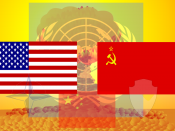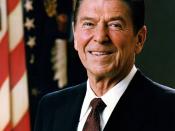Throughout the Cold War, the U.S. National Security Policy was implemented on the sole basis of deterrence. At the time, this policy held the ability to ward off any potential threats; the effectiveness of this system was based on the mere fact that possible invaders would seriously contemplate the results of their action. The chief reason as to why the United States held such a powerful stance is the fact that the United States, at the time, was facing a rational enemy that would make rational decisions based on the power of the United States. However, since the conclusion of the Cold War, the U.S. National Security Policy does not enjoy the same leisure with the introduction of rogue states and dictators. Due to the difference in motivations, the United States cannot assume any rational decisions to be made by these powers.
During the Cold War, the United States had the tremendous benefit of facing the Soviet Union, a rational actor.
Facing a rational adversary permitted the United States to focus its Security Policy with one major deterrent, nuclear power. This understanding of opposing power made it essential that both actors, the U.S. and Soviet Union, developed rational policies, with rational decisions. Even through the most heightened periods of the Cold War, rational was able to prevail and save millions of lives.
Immediately following the Cold War, the United States was under the impression that the current policy, that was successful in defending against the former Soviet Union, could still be inant throughout the mid-to-late-nineties. However, as rogue states became more prominent, the thought of facing a rational enemy became non-existent. During the Cold War, policy was implemented under the mindset of a rational thinker, but with the fall of the Soviet Union, only...



Excellent
i like the detail, the lengthy paragraphs, the description, the facts, and etc........
0 out of 0 people found this comment useful.